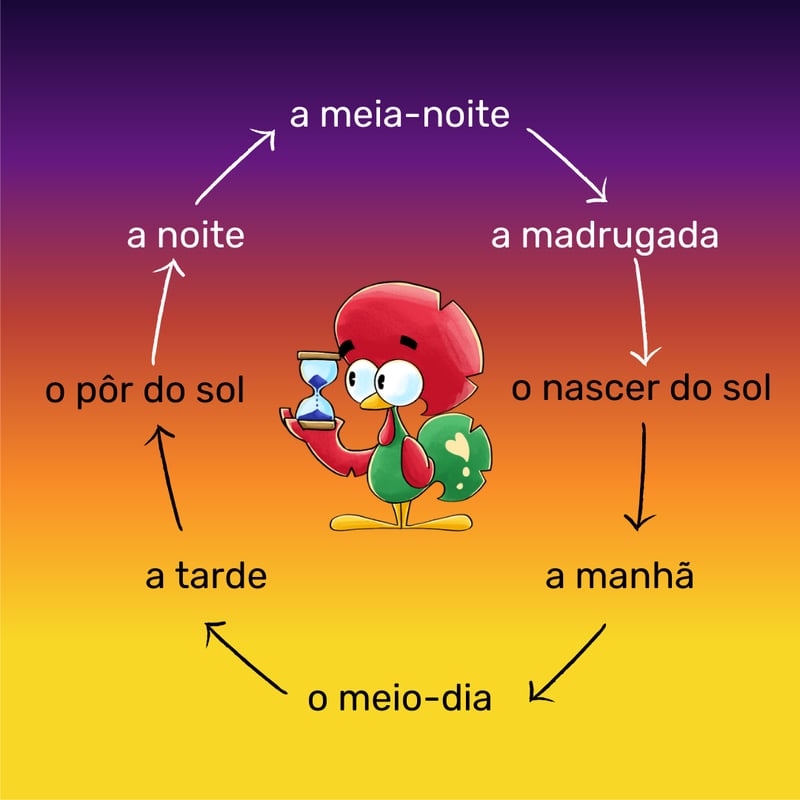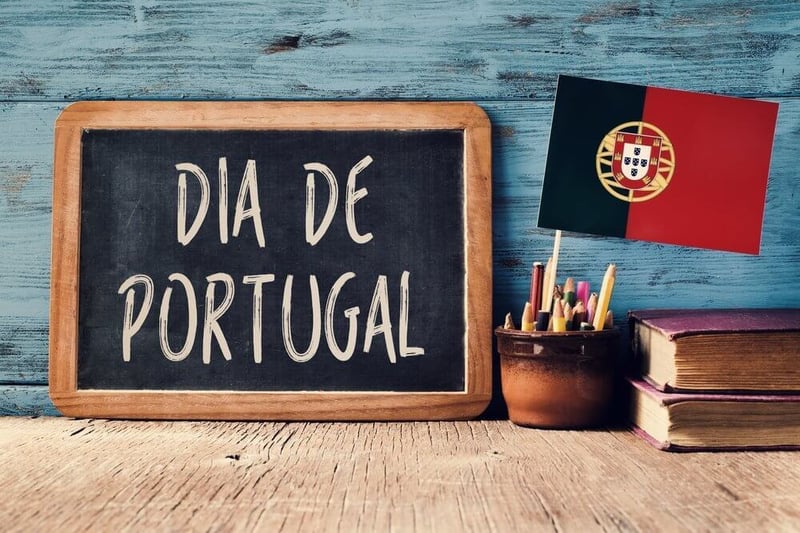Damiana and Rui chat about what they like to do during different seasons of the year in Portugal. (Recorded in September 2024)
Estações do Ano
Seasons of the Year
Horários Tardios
Late Hours
Luís describes his sleeping habits.
Ainda Vamos a Tempo!
We’re Still On Time!
A father who’s always early vs. a daughter who’s always late… It’s about time (pun intended) for an episode like this! Language focus: words and phrases related to time and numbers.
Semana Produtiva
Productive Week
A man talks about what he did yesterday and today. Notice how different forms of the past tense are used throughout the story.
O Concerto Da Gisela
The Gisela Concert
Pedro and Rita make plans to go to a concert.
Times of Day in Portuguese
Let’s go over the times of day in Portuguese! These are the from sunrise to sunset: – from until 6am/dawn (around ) – from about 6am until – from noon until about 6pm (or around when it gets dark) – from about 6pm to midnight
O Tempo e as Estações
Time And Seasons
A teacher leads his class in a lesson about the calendar. The students answer questions about time, dates, seasons of the year, and weather.
How to Say Large Numbers in Portuguese
In the next couple lessons, we’ll let you practice with large numbers, such as those in the ten-thousands and hundred-thousands. A few reminders: – Remember that 100 is cento when it’s part of a number (i.e. followed by e) – Remember that 100 is just cem when it’s by itself (i.e. not followed by e) Here’s […]
Por Quem Me Tomas?
Who Do You Take Me For?
Miguel has a short conversation with Bruna before heading to the grocery store. Notice how the preposition “por” is used in a variety of different contexts throughout their dialogue.
Talking About the Past with “Haver”
The Portuguese often use the verb to discuss the past, whether it be minutes, hours, days, months, or years. In these contexts, haver is an impersonal verb, meaning that it doesn’t take a particular subject and is always used in the present tense form of the third-person conjugation: Normally há means there is or there are. However, […]
Adverbs of Time: Almost, Always, etc.
can tell us when, how often, or for how long an action happens. As with most other Portuguese adverbs, adverbs of time are always invariable. In this lesson we’ll start with some of the most frequent adverbs of time in Portuguese, which are: Quase We dealt with quase in the previous lesson, as an adverb […]
Adverbs of Time
In this lesson, we’ll look at more examples of Remember: adverbs of time are always invariable, meaning they do not change form to match the gender or number of the word they reference. Cedo Tarde
Saying Goodbye in European Portuguese
Let’s learn how to say goodbye in Portuguese! There are many options, depending on who you are talking to, the time of day, or how long it will be until you see them again. Take a look at the infographic below for a quick guide:
Today, Yesterday, and Tomorrow
Here’s how we refer to the present day, the day before, and the next day: Now let’s put them into context: By combining the terms and with ontem and amanhã, you can also form expressions to refer to
Relationships of Time
Let’s explore some examples of the most common words used to talk about the order and relationships among different events in time. It’s important to be able to talk about now, later, earlier, before, and after in Portuguese. Current Time is the term we use to refer to the present. Past and Future We use […]
Seasons of the Year
The seasons of the year are called in Portuguese. Their names have Latin origins, which by now you may have noticed is very common in Portuguese. (Don’t you wish you had paid more attention to Latin in school? 😜 ) Just like English, the seasons of the year are not capitalized in Portuguese.
Portuguese Holidays
The Portuguese calendar has several holidays and holiday periods throughout the year. Holiday can have two meanings in Portuguese: – A public holiday, or day to celebrate something of specific cultural or religious importance at a local or national level. – A planned period of time off work or school. Férias are often scheduled around […]
Months of the Year
As you saw in previous lessons, the days of the week are very different from other languages. But as luck would have it, the names of in Portuguese are quite similar to other languages, since we all use the same Gregorian calendar. All the names share common roots in Roman culture.
Hours and Telling Time
Let’s learn how to tell time in Portuguese! That way you’ll know whether you are , , or . 🙂 If you don’t have a phone or watch with you, you could ask someone , i.e. “What hours are there?” A more formal/polite option is: , i.e. “Do you have hours that you tell me?” The […]
European Portuguese Greetings
Let’s start with the basics! One of the simplest Portuguese greetings is and one of the simplest ways to say goodbye is , or the slightly more formal . However, it’s also very common to say hello or goodbye with a more specific greeting based on what time of day it is. Portuguese Greetings Throughout […]
Days of the Week
In Portuguese, the naming of does not take inspiration from the planets and gods, as is the case for many other languages. Instead, they are simply numbered. The origin of the names of the days of the week in Portuguese The numbering of each weekday in Portuguese might have to do with ancient Easter celebrations, […]



 Damiana
Damiana Rui
Rui
 Joel
Joel Luís
Luís
 Eliana
Eliana

 Mónica
Mónica

 Eduardo
Eduardo

 Natacha
Natacha Pedro
Pedro










